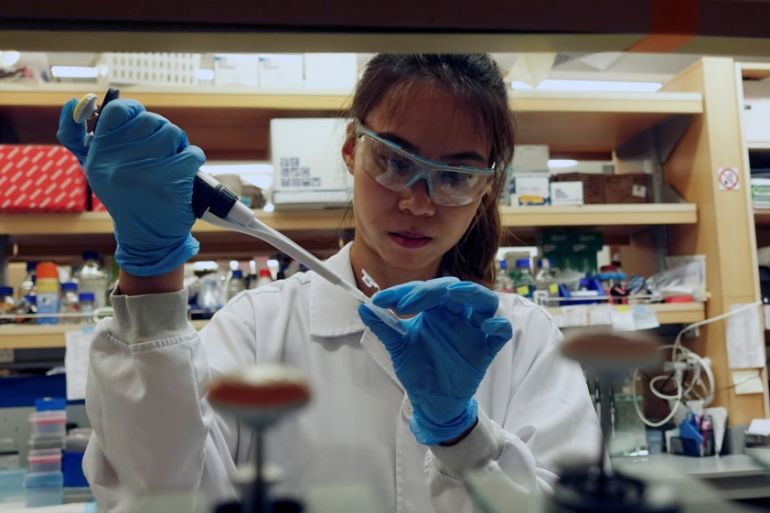Vaccines alliance raises $8.8bn for global immunisation plans
The Gavi international group raises money to fund immunisation programmes through to 2025 amid the coronavirus pandemic.

Governments, companies and individuals around the world have pledged $8.8bn for a global vaccines alliance to help immunisation programmes stalled by the coronavirus pandemic and support the development and distribution of a potential COVID-19 vaccine.
The virtual meeting on Thursday beat a funding target of $7.4bn for Gavi, the Vaccine Alliance, to provide vaccines at a reduced cost to 300 million children worldwide over the next five years, the international group said.
Keep reading
list of 3 itemsGSK aims for 1 billion doses of booster for coronavirus vaccine
Hydroxychloroquine tied to increased risk of death: Study
More than 50 countries took part, as well as individuals such as billionaire philanthropist Bill Gates, whose foundation pledged $1.6bn.
“Together, we rise to fulfil the greatest shared endeavour of our lifetimes – the triumph of humanity over disease,” said British Prime Minister Boris Johnson, who hosted the summit.
“Today we make the choice to unite, to forge a path of global cooperation.”
As scientists around the world race to develop and test a coronavirus vaccine, Gavi and partners also launched a new financing drive to buy potential COVID-19 vaccines, scale up production and support delivery to developing nations.
“A vaccine must be seen as a global public good – a people’s vaccine, which a growing number of world leaders are calling for,” United Nations Secretary-General Antonio Guterres said in a video message.
There needed to be “global solidarity to ensure that every person, everywhere, has access”.
US donates $1.6bn
The pandemic has exposed new ruptures in international cooperation, notably with President Donald Trump’s recent decision to terminate the United States’ relationship with the World Health Organization (WHO).
However, Washington pledged $1.16bn to Gavi, and Trump sent a recorded message to the conference, telling delegates: “As the coronavirus has shown, there are no borders. It doesn’t discriminate.
“It’s mean, it’s nasty. But we can all take care of it together … we will work hard. We will work strong.”
Gates, co-founder of tech giant Microsoft, earlier said pharmaceutical companies had been working together to try to secure the required production capacity.
“It’s been amazing, the pharmaceutical companies stepping up to say ‘yes, even if our vaccine is not the best, we will make our factories available’,” he told BBC radio.
Last month, the WHO, the UN children’s agency UNICEF and Gavi warned that vaccine services were disrupted in nearly 70 countries, affecting some 80 million children below the age of one.
“Measles is still a global killer”, said Annie Sparrow, assistant professor of population health science and policy at Icahn School of Medicine at Mount Sinai in New York, citing outbreaks in countries of sub-Saharan Africa, the US and other parts of North America as well as in Cambodia, Ukraine and Italy.
“This is not the last pandemic and we need to make everyone a little bit stronger and more resilient because putting all of our money into the COVID vaccine doesn’t prepare us for the next pandemic or the one after that,” she told Al Jazeera. “We have to be very smart about this and look at vulnerable populations.”
Polio eradication drives were suspended in dozens of countries, while measles vaccination campaigns were also put on hold in 27 countries, according to UNICEF.
“We cannot exchange one deadly outbreak for another. We cannot afford to lose decades of health gains that everyone has worked so hard to achieve,” Henrietta Fore, UNICEF executive director, said. “We need joint, concerted efforts to put vaccination back on track and there are many ways we can do this.
Guterres urged the conference to commit to finding “safe ways to continue delivering vaccinations, even as COVID-19 spreads”.
Recent Gavi-supported modelling from the London School of Hygiene and Tropical Medicine estimated that for every coronavirus death prevented by halting vaccination campaigns in Africa, up to 140 people could die from vaccine-preventable diseases.
“More children in more countries are now protected against more diseases than at any point in history,” said Seth Berkley, the chief executive of Gavi.
“However, these historic advances in global health are now at risk of unravelling as COVID-19 causes unprecedented disruption to vaccine programmes worldwide,” he said.
“We face the very real prospect of a global resurgence of diseases like measles, polio and yellow fever, which would put us all at risk.”